MINIMALISM AND MENOPAUSE: HOW THE MINIMALIST LIFESTYLE HELPS DURING MENOPAUSE
Menopause and perimenopause is an inevitable part of a woman’s life, but it can create a whole host of problems that can affect day to day life. In this article I share some personal thoughts around minimalism and menopause and how the minimalist lifestyle helps during menopause to reduce symptoms and make life a little easier.
Editor’s note: I am not a medical expert and this article is purely a personal and honest perspective to share my own experiences around minimalism and menopause. If you have any concerns or questions for yourself around menopause, please do seek professional support.
A TRIP TO A&E
I ended up in Accident and Emergency some time ago. I’d eaten peanuts, had trouble swallowing, convinced myself I was having an extreme allergic reaction which led to a major panic attack and symptoms similar to a TIA (a mini stroke). A few hours in hospital and various checks completed, all showed that my panic attack was nothing more than a culmination of my body’s extreme reaction to stress and anxiety.
I was relieved and calmed, until my next panic attack, which this time was related to my car, not peanuts. My daily commute involves sitting in traffic, but that day I was convinced that my car would break down or explode mid traffic jam. It got so bad that I couldn’t get in the car, let alone drive, which made my life as a working parent difficult or near impossible!
I am not allergic to peanuts and if my car breaks down, then I can call for help. But neither of these factors made any difference to me whilst in the midst of anxiety.
HOW MENOPAUSE AFFECTED MY DAILY LIFE
I couldn’t get in lifts, fly in an aeroplane or use my gas cooker (for fear of a gas leak). I hated being alone in case something bad happened and I carried an impending sense of doom with me wherever I went.
Life felt flat, without joy or ease. I didn’t feel like laughing, couldn’t muster up enthusiasm for much at all and I felt a shadow of my former energetic, positive, motivated and bubbly self.
My energy levels dipped, tiredness and fatigue took over. The things that I used to enjoy felt a drain, a hassle and on some days, it was all I could do to get myself out of bed and the kids and I ready to go to school and work. Until, that is, I went to open the car door and felt too terrified to get in.
I developed weird and (not so) wonderful health problems. Dry eyes, itchy skin, gut issues, muscular problems and referring pain which gave me persistent headaches and tightness around my neck and throat (back to triggering those swallowing difficulties again).
Added to these random symptoms, I also developed health anxiety and every little niggle felt like it was the beginning of the end.
In short, my physical and mental health was taking a battering and until I started to research why and put all the pieces of the jigsaw puzzle together, I thought I was going mad.
PERIMENOPAUSE AND MENOPAUSE AWARENESS
It was such a relief to learn that it wasn’t madness but hormones that were impacting every facet my daily life.
Now, I know that the majority of what I was feeling in both body and mind were to do with fluctuating and decreasing oestrogen, progesterone and testosterone and the effect of these on all the other hormones that our bodies rely on to function properly.
Generally, my symptoms are/were pretty normal, my menopause is normal. If you struggle with some, all or different symptoms around perimenopause (the stage before menopause) and menopause (the absence of a period for more than 12 months) then please don’t feel you’re alone.
Many women feel the same and certainly don’t feel like themselves!
To learn more about the effects of perimenopause and menopause on the body and brain, there are some links at the end of this article that you may find helpful.
There are many resources and sources of support and they often encourage openness and awareness about menopause and the effects on women who are trying to do and have it all.
Success, achievement, goals, dreams and living a meaningful life, whilst still juggling jobs, family, homes, a social life, financial pressures. And the list goes on.
We often find we can’t do it all at the best of times so it’s not surprising so many of us, otherwise competent and independent women, start to struggle so much when menopause begins to hit.
Sharing some of this information and having open and honest conversations around menopause and how it’s affecting you, is key to helping those around you help you back.
Giving my husband a short crash course on how and why menopause is affecting me has been helpful to him as much as to me. For example, if I’m having a weepy day, or a day where I feel excessively tired, that’s when he knows making the dinner (aka order takeout!) is going to help so much.
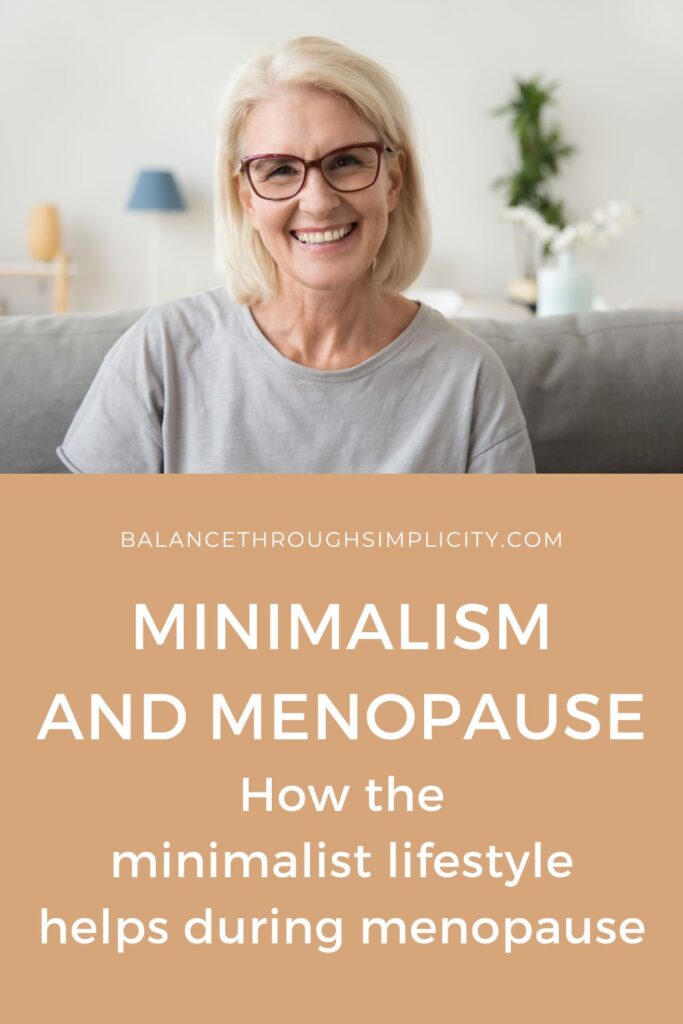
MENOPAUSE AND LIFE
Aside from the personal effects of menopause, many women also face additional challenges in their 40s and 50s which, as I’ve discovered in my own life, also contribute to the daily struggle.
For example, you might:
- Have an established and demanding career
- Have relationship difficulties
- Have parents who are aging and need more support
- Have teenagers (need I say more!)
- Have adult children leaving the home and you’re suddenly an empty-nester
Life’s challenges still come at us and what I’ve mentioned above seem to be particularly prevalent for women in the years around menopause.
I’m juggling two jobs, teenagers, moving home and the death of my mum and these all weigh heavily on my body and brain.
My capacity to juggle the conflicting demands of daily life, to multi-task, to stay focused, in control and even remember why I walked into a room in the first place, all make getting through my day much more difficult! Let alone getting through that day with humour, enthusiasm and plenty of energy.
TREATMENTS FOR MENOPAUSE
I remember talking to my mum about menopause and she was of the generation where it wasn’t discussed. Women had all the symptoms but I think were expected just to get on with it.
For some of us, the symptoms of menopause might be less than for others. Maybe more of a slight inconvenience than anything else.
For myself, I’m aware that my most uncomfortable menopause symptoms are to do with my mental health and functioning, particularly the internal anxiety which presents as physical problems (and which, in a true vicious cycle, then just make my anxiety worse).
Perhaps this effect of menopause is related to mental health problems I suffered years ago so I’m more vulnerable to this effect of hormonal imbalances. Again, I tell myself often that I’m not going loopy – it’s the hormones!
In terms of treatment for menopause, it seems that we have come a long way in openly discussing menopause and offering treatment options – from HRT to more holistic therapies and lifestyle changes.
However, there’s still some progress to be made in educating the medical community, workplaces and women in general to ensure that the appropriate treatment is offered and made available to all those that could and would like to explore and use it.
MINIMALISM AND MENOPAUSE
I love to explore ways that minimalism and the minimalist lifestyle can support us through different life challenges. When I began this blog about decluttering and simplifying, the topic of how minimalism could help reduce the challenges of menopause was definitely not on my radar!
However, here I am writing about minimalism and menopause!
Perimenopause has affected me personally in many ways and has been an unexpected challenge in my life far beyond hot flushes and sleepless nights.
However, aside from the usual recommendations of yoga, meditation, regular exercise, watching what you eat and HRT (hormone replacement therapy) if it’s available to you, I wanted to share some ways that I think the minimalist lifestyle has helped me through my own menopause symptoms. Maybe they could help you too?
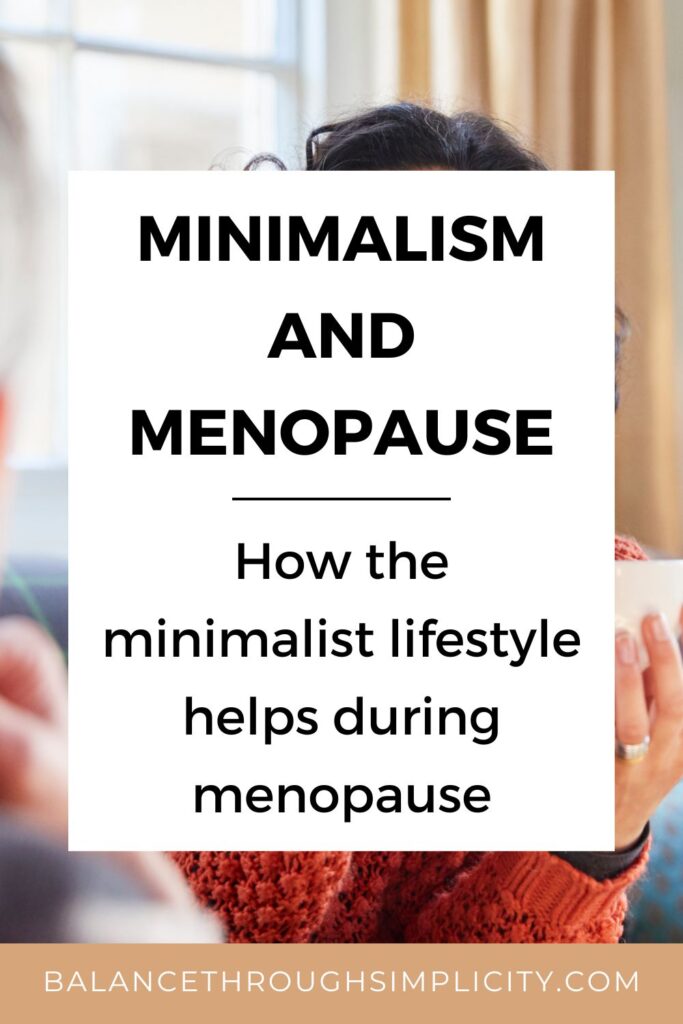
MINIMALISM AND MENOPAUSE: HOW THE MINIMALIST LIFESTYLE HELPS DURING MENOPAUSE
Here are some personal thoughts around minimalism and menopause and how the minimalist lifestyle helps during menopause.
1. Minimalism isn’t just about your stuff
Firstly, and in case you’re new to minimalism, I’d like to mention that minimalism isn’t just about your stuff. We’ll look at stuff soon, but minimalism is a lifestyle that encourages us to focus on what matters. Minimalism is not about having few clothes, limited furniture, never shopping or cold, empty and dull homes.
To understand how minimalism can help in menopause, we need to understand that minimalism is a lifestyle choice. Making small decisions every day about what’s important and keeping out, getting rid of and letting go of anything else.
These small decisions build together to create a life that’s more on your terms. If you’re new to minimalism you might enjoy this article on what is minimalism (and a few things it’s not).
2. Minimalism is about having less stuff
Although minimalism is a lifestyle, it IS based on having less stuff. By stuff, I mean excess, unwanted, unused stuff that doesn’t add meaningful value in some way to your home and life.
What that means in practice looks different to everyone. If you love something, use, need and appreciate it then keep it.
Minimalism isn’t about not having stuff, it’s about WHY you have and keep it. Generally, when we ask ourselves these questions, the outcome is often that we need less ‘stuff’ in our lives.
You could read more about why minimalism isn’t just about stuff.
3. The benefits of less clutter
One of the most obvious benefits of the minimalist lifestyle is that having less stuff means your home is quicker and easier to keep clean, tidy and manage. You can spend less time cleaning, less time moving things from A to B and you can focus more on what your body and brain needs, not what your home needs.
Here are some minimalist cleaning tips and how to spend less time cleaning.
4. A better functioning home
When there is less clutter, you can more easily store and organise what you do have. It’s easier to keep tidy, easier for your family to put things away and to help you manage the home.
You have more space to make your home function better. Perhaps in the way your furniture is laid out in each room, what you decide the purpose of each room is (e.g. a guest bedroom could become a home office if it’s not used for guests or as a dumping ground for random clutter) or where you work or your kids study.
- Your sleep patterns might be all over the place. Hot flushes, night sweats, trips to the toilet. Having a decluttered bedroom, that’s cool, bedlinen made of natural materials, no screen time before bed and a calm evening routine and uncluttered surfaces can all help. Here are some tips on how to declutter your bedroom and why it matters.
- Clear kitchen counters can help make food prep and cleaning your kitchen easier. Avoid extra stress at the end of the day when you’re tired and hungry by making your kitchen simpler to use and better functioning.
- Have a regular place for keys that you use consistently so you’re not always on the hunt for them which can waste time and be frustrating. What else do you use regularly that you also can’t find regularly? Give it a home!
Less clutter means more focus on how your home supports you rather than just how you store and lay out your stuff.
5. Become more organised more easily
Menopause is often associated with brain fog and forgetfulness. I used to remember appointments easily, or when my kids needed to take in their PE kits on PE days, or that I need to re-stock on toothpaste. These days it sometimes feels like I can’t even remember which kitchen cupboard holds the dinner plates!
When your home has less stuff it’s easier to organise yourself, your To Do list, your paperwork, your fridge, freezer and kitchen cupboards.
Less inventory to manage means it’s easy to see what you’ve got and what you need.
Here are some tips on how to organise your home and life.
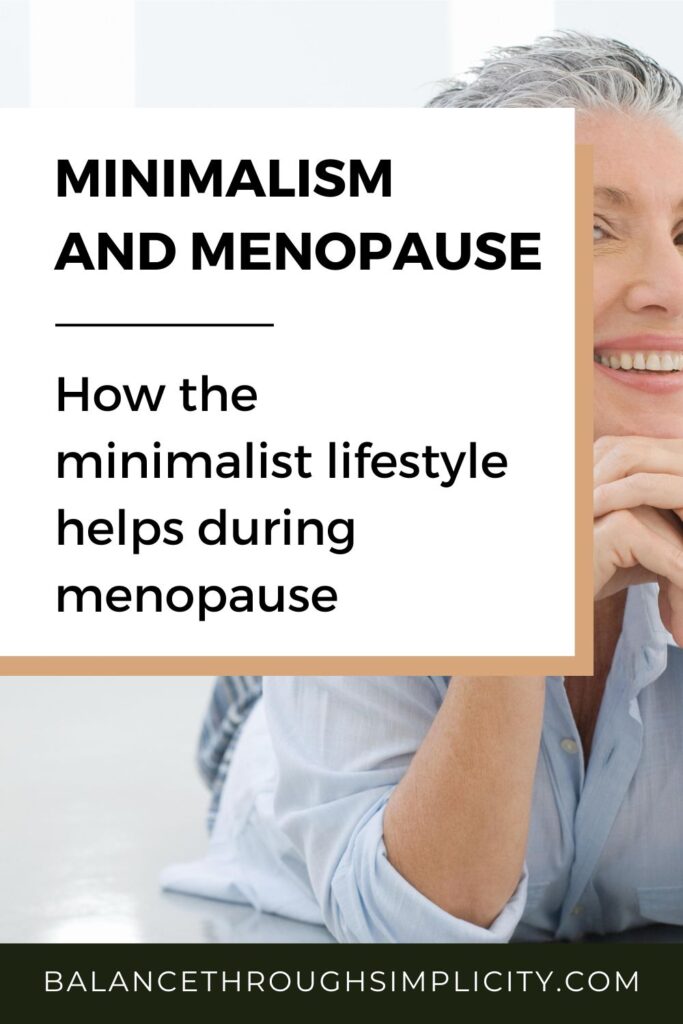
6. Establish helpful habits and routines
The minimalist lifestyle is about what’s important to you and finding ways to honour those. It’s having an awareness that sometimes we have to consciously MAKE these things happen and create space for them to happen. Busy life often doesn’t let them happen just because we wish them.
One of the ways that I make things happen in my own life is by putting in place some habits and routines, particularly for things that I’m not so keen on – cleaning, grocery shopping and cooking.
Habits and routines, for those who find them helpful, make big, onerous, mundane or repetitive tasks feel easier and more manageable. This is great for menopause when even getting out of bed can feel like a major hurdle.
Try these habits for a simpler life.
7. Enables more support from others in your home
Circling back to a couple of points I mentioned earlier, the minimalist lifestyle facilitates easier organising and a better functioning home. Both of these things helped my own kids and husband do more around the house, which in turn helps me.
Everyone knows where things are stored. They don’t rely on me to find the vacuum, the laundry detergent, clean uniform, or the dog’s medication. This means that everyone can do their bit when I feel I can’t. Being honest though, I do often have to ask and remind them!
8. Makes healthier eating more possible
My kitchen cupboards, fridge and freezer follow my minimalist lifestyle. By that I don’t mean they’re bare (this isn’t what minimalism is about), but they do only contain food that we like to or should eat, is healthy and nutritious and it’s all in date and used regularly. You won’t find stuff that’s gone stale or that we don’t enjoy eating on a pretty regular basis.
My cupboards are like this, not because I’m ultra-organised and have lots of time and energy to micromanage my food by colour, type etc, but it’s more because I don’t have random food clutter and I make myself meal-plan every Sunday.
I look through the food I have, what needs using up, what stocks I need to replenish and then place my online grocery order every weekend.
I rotate our favourite meals, only try something really different when I have time and energy, and keep staple ingredients in the cupboards and fridge that I can use in a variety of ways.
I only buy snacks, drinks etc that I want my family and I to eat and drink. If it’s not in the house then I’m much less likely to make a special trip to the shops so if I want to avoid the high sugar food then I just don’t buy it. I don’t have to rely on willpower when my body is craving something sweet.
I also find that I’m more sensitive to mood fluctuations resulting from hunger so it helps to have healthy snacks more handy than sugary ones. My minimalist approach to healthy eating means I’m more intentional about the food and drink I consume.
If you struggle with gut problems, or difficulty sleeping, having healthy eating habits can really help. Avoiding caffeine, spicy foods and alcohol, particularly before bedtime, might help.
Here are some tips for healthy eating made simple.
9. More free time
I get tired more easily. I’d love a mid-afternoon nap if my day allows but if that’s not possible, I factor in time for sitting quietly with a cup of tea.
Work, after-school activities and life in general all place demands on our time and schedule.
I’ve learnt that slowing down, saying no, being careful to block out quiet time today after a busy day yesterday, or a quieter afternoon after a hectic morning, are all important ways to create more free time.
Sometimes we plan stuff for the weekend, other times I just enjoy catching up on housework, watching TV, chatting with the kids or writing for my blog, when I haven’t been able to do much of these during the week.
More free time is time for whatever your menopause body and brain need at the time!
Here are some tips on how to be less busy or to enjoy slow living.
10. More focus and clarity
I find that brain fog and lack of mental clarity are more of a problem these days.
I’m quite a decisive person, but lately I find it’s sometimes difficult to assimilate information and come up with a game-plan or solution to a problem. Other times I’m right on point and with it.
When I have less things to think about because a) my home is clutter-free b) I’m more organised and c) I have more free time, then I have less to think about.
A decluttered mind is a great way to achieve more focus – for work, for managing your schedule, planning out your meals, meditating, having quality time with your kids, spouse and friends, even reading a book and actually being able to remember what you read!
Try these tips on how to declutter your mind for more clarity and peace.
11. Fewer barriers to exercise
I love to do yoga and Pilates at home. They help with suppleness and strength, the latter which is good for reducing osteoporosis which women are especially susceptible to after menopause.
Exercise is also important as our metabolism slows and we begin to hold fat and gain weight, even with little or no difference to our eating habits. Exercise also has mental health benefits so exercise during menopause is vital.
However, when our homes are cluttered and our schedules overstuffed, the last thing we probably feel like doing is exercise. I get this too!
One thing that’s made my exercise more realistic and easier is to have readily available space for my yoga mat and anything else I might need, and for me to move around in. No stuff getting in my way as I find a corner of my living room to lay out my mat and less squeezing my yoga session in between back-to-back meetings and school runs.
Minimalism has helped remove the barriers to exercise and makes it easier for me to do so I’m more likely to do it!
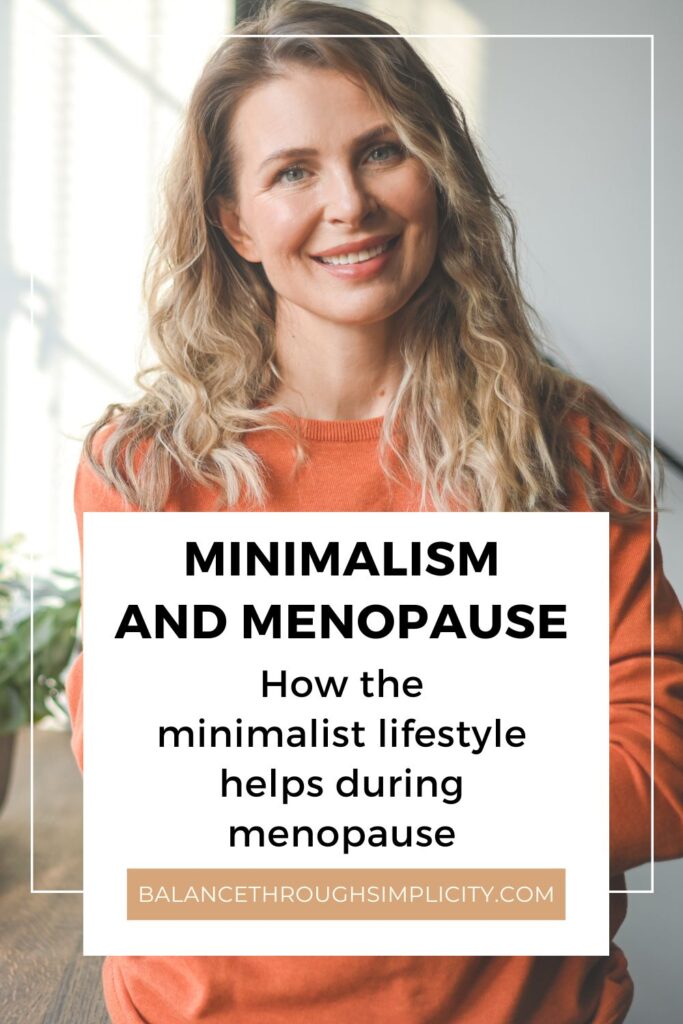
12. More space for meditation and calming activities
Menopause either puts my brain in a fuzzy fog or makes me feel overwhelmed and in overdrive.
The way I counteract that is to meditate, enjoy silence (when the kids allow), journal, listen to audio books and podcasts, watch TV and read – all depending on my mood.
Having a quiet space for these activities and even a self-care box (containing my current book, ear pods, candle, notebook and pen etc) which is nearby and I can carry around to wherever I want it, makes it so much easier to enjoy my moments of calm. I don’t need to clear space, get all the things I need and only then to run out of time to make use of them!
13. Medication and beauty products
My skin and hair are feeling the effects of fluctuating hormones and occasionally I need indigestion tablets, paracetamol or other medications. I don’t want to be rooting around to find these items when I want to use them, I like to have them nearby.
For my hair and skin care products, I prefer to use specific fragrance-free, extra-moisturising ones, instead of the ones I buy for my kids and husband so it’s important that, once I’ve found something that I love, that I don’t run out!
My minimalist bathroom means I don’t have random products I never use, empty bottles that I haven’t thrown out and instead, I can find what I’m looking for and know when I need to re-stock. Moisturising my dry, itchy skin and taming my frizz-prone hair is now easier and more pleasurable!
14. Minimalist wardrobe
I haven’t put on weight or really noticed a difference in body shape but I do find that I’m more picky about my clothes – the fit, shape, colour and I prefer comfort over style. I also prefer natural fabrics instead of synthetic because it lets my body breathe and not get too hot!
Decluttering my clothes, deciding which clothes to keep and creating a minimalist, capsule wardrobe full of pieces which have become my favourite ‘uniform’ on a busy morning have all saved time and stress. It helps me feel good about myself from the inside and out.
How we feel about ourselves determines how we show up for our lives and feeling confident in what we look like plays a vital role. Age is just a number so I don’t believe your menopause body needs to be dressed in a certain way, just enjoy your clothes and feel a freedom in dressing how you want to look and feel.
15. More effective and consistent self-care
We all know the value of self-care and that this means more than hot baths and squares of chocolate. However, in mid-life, women tend to have a lot of pressures and responsibilities which come with the territory – work, kids, parents, mortgages, health issues etc etc.
Add menopause into the melting pot and that’s a tough combination! Increased fatigue, stress and probably less sleep, makes it difficult to function as well as you can so prioritising self-care becomes increasingly important.
Whether it’s doing your nails, walking around the block, taking a nap, joining a spinning class or getting your hair done, anything that boosts your mood and recharges body and mind counts as self-care. So too, does chilling out in bed watching TV. There’s no judgement here from me on that one!
A minimalist approach to your schedule and prioritising the things that matter can help you build in time and space for self-care.
Try this free worksheet on how to schedule your priorities or this Self-Care Workbook to help you create a regular self-care plan for your busy life.
16. PMS and irregular bleeding
For some of us, PMS and irregular bleeding becomes more profound during perimenopause, before our periods stop altogether.
This may mean that for some days/weeks out of your cycle you may be feeling worse than others. More emotionally up and down, wanting to be less physically active and more likely to be searching for a cosy place and chocolate.
Understanding your body rhythms and cycle can help you adjust your daily, weekly and monthly schedules and a minimalist approach to what and where you spend your time and energy can really help.
17. Managing anxiety
I mentioned before that anxiety has been the biggest problem for me in the last 2 or 3 years but I think some minimalist principles have really helped me combat it.
Firstly, I am very mindful of what I consume on social media. The algorithms are very sensitive and I have to be careful not to accidentally end up watching something that triggers my anxiety and then for Instagram and Facebook to keep on showing me similar videos because they think I’m interested.
Secondly, I love YouTube for guided meditations, the Calm app for daily walks and movement meditations and audio books for distracting me from my thoughts.
These are really important tools for me to manage my anxiety and whenever I feel that anxiety spiralling I reach for my phone and ear buds and start to listen. My phone has become my friend and I curate the content I consume very carefully. And, I don’t have lots of apps to sift through to find the ones I need. I delete any that I don’t use regularly!
You might enjoy this article on minimalism and social media for some ideas.

18. Less rushing
I used to feel I had Rushing Woman’s Syndrome, but I usually can’t keep up with myself now!
I’ve discovered that a slower and simpler lifestyle is best for me at the moment. I feel in control of that, like it’s manageable. I still get done what I need and want, but without running like Flash from one place to another.
I can go slow, appreciate the present, have flexibility to do something on a whim or just because I feel like it. Less overbooking, running late, apologising, hurrying, chasing – more peace, calm and less speed.
It’s not that we don’t do all the things we used to, we just spread them out more and give ourselves room for manoeuvre.
19. Less stress
With all the ways the minimalist lifestyle helps menopause symptoms in my own life, I think the combined effect has been to reduce my stress levels.
Being less busy, tending to my self-care, managing my mental and physical health, creating a home environment that’s easy to run and that I can delegate duties to my kids and partner (instead of feeling like I have to do it all) and changing the way I do things, have all helped cut stress and promote wellbeing.
I may no longer be able to burn the candle at both ends, get up early and work late without feeling tired. I pay for it more the next day if I’ve enjoyed some wine the night before but, generally my stress levels are down even if my hormones are bouncing around like crazy!
20. A clearer vision of your goals and priorities
Joshua Becker from becomingminimalist.com defines minimalism as “the intentional promotion of the things we most value and the removal of everything that distracts us from it.”
Minimalism almost forces us to be more aware of what we want in life and what we don’t. In turn this helps us get clear on our priorities and create goals that actually matter (instead of what busy life dictates that matters).
Minimalism enables us to have a vision for the future based on what’s really important.
- Building strong relationships with others
- Prioritising health and well-being
- Building in ways to be happier in your every day
- Finding a purpose and living a meaningful life
- Setting SMART goals
As we reach menopause and come out the other side, we are older, wiser and often more confident and content in who and what we are. I love this quote from Oprah Winfrey…
“So many women I’ve talked to see menopause as an ending. But I’ve discovered this is your moment to reinvent yourself after years of focusing on the needs of everyone else. It’s your opportunity to get clear about what matters to you and then to pursue that with all of your energy, time and talent.”
Oprah Winfrey
SHARE YOUR THOUGHTS
I hope this article on minimalism and menopause has been helpful to you. Maybe you’re experiencing menopause symptoms and just want to know that you’re not losing your mind and you’re not alone – somebody else feels like you do.
Perhaps your wife, partner or friend is struggling with this. Menopause affects relationships as well as individuals.
Some days are better than others so give yourself grace to feel how you do. Those feelings are valid and there’s usually a scientific explanation. However, I do hope that some of what I’ve shared might be useful.
I’d love to hear from you if you have any thoughts or suggestions to add. How has menopause affected you and has/could minimalism as a lifestyle help reduce or alleviate some of the symptoms and side-effects of menopause. Do any of my experiences sound familiar to you?
Please leave a comment below!
Here are some more topics related to minimalism and menopause that may be helpful to you in different ways:
- Decluttering in Midlife: How to Declutter in Midlife With Ease – Midlife is a time of change and transition. Whether you’re downsizing, moving home, want to free up time and energy or just want a fresh start, here are some tips on how to declutter in midlife with more ease and less stress.
- How To Make Your Home A Sanctuary – I wanted to share some ideas on how to make your home a sanctuary from the busy outside world. Here are some tips to help you create a calm, cosy and inviting haven where you can rest, reset and recharge.
- Minimalist Lifestyle Tips: How to Embrace Minimalist Living Every Day – Minimalism is a wonderful way of making sure that your life is heading in the direction you want it to, with plenty of time, space and freedom for honouring the things that matter most to you. Here are some minimalist lifestyle tips and ideas on how to embrace minimalist living every day.
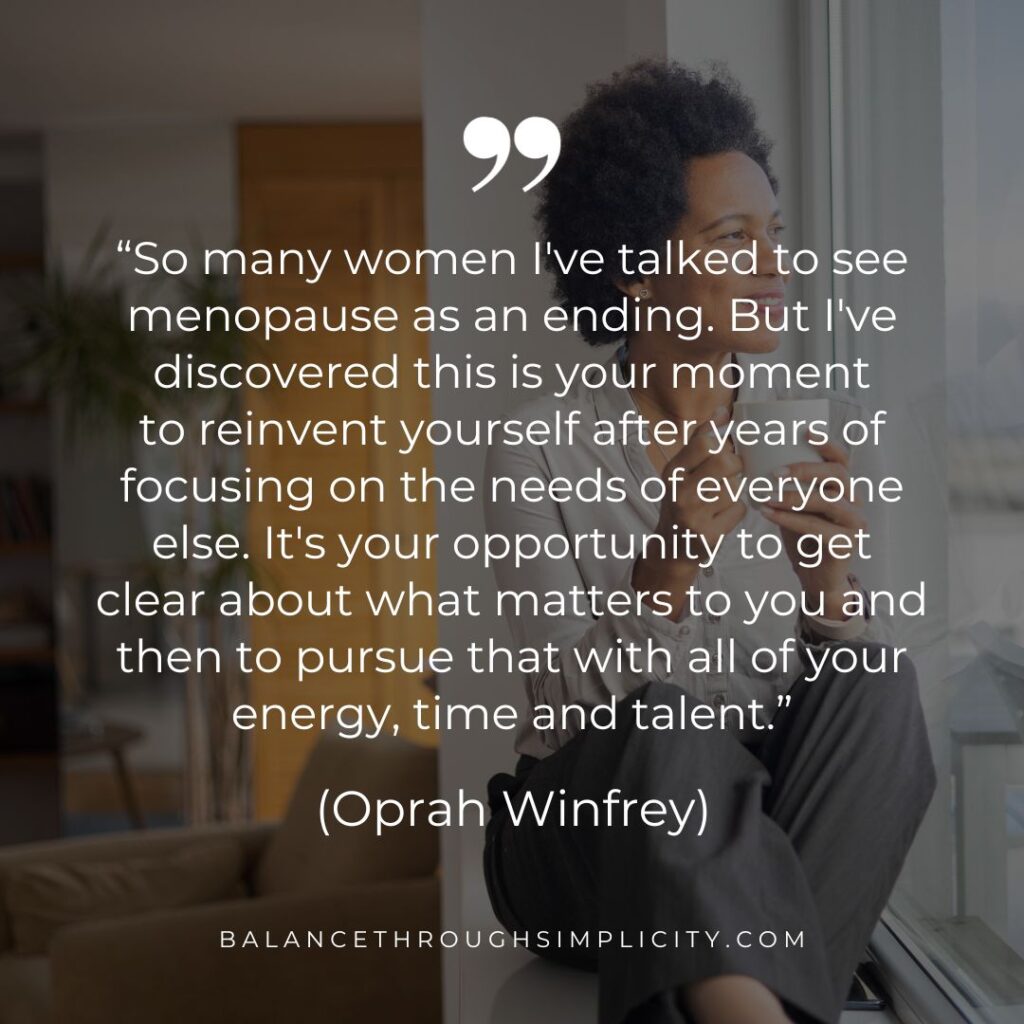
FURTHER MENOPAUSE RESOURCES
- The Menopause Charity
- National Menopause Foundation
- The Dr Louise Newson Podcast
- Dr Mindy Pelz, Author of the Menopause Reset explaining the role of hormones in menopause
DON’T MISS OUT!
I’m Antonia and on this blog I share practical inspiration to simplify your home, time and life. Follow me on Instagram, Facebook and Pinterest! You can also subscribe to Balance Through Simplicity and receive regular simplicity tips straight to your inbox for free. Make sure you never miss an article plus you’ll get a copy of my free Declutter Starter Kit as a welcome gift!

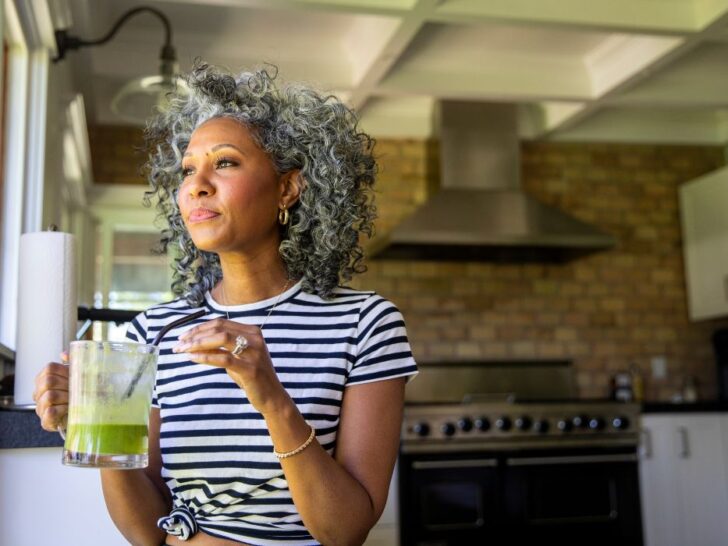
Kristi
Monday 25th of September 2023
Thank you for this article, Antonia. Until reading of your experiences, I truly thought I was going mad too. My anxiety is off the charts all the time, despite medication, and it's a relief to know it's at least partly (and perhaps all) down to hormones. So far, I am still in perimenopause and am hoping menopause brings some relief because it's been a rough ride. But to simply know all this unpleasantness is normal is a huge relief and to know I am not alone is also a comfort. I guess it's true what they say: misery loves company! Thank you again for this honest and insightful article.
Balance Through Simplicity
Monday 25th of September 2023
Hi Kristi, thank you so much for reading and your comment! I know how you feel. I too couldn't understand why all these random things were happening, seemingly out of the blue. They say that knowledge is power so I think it's important to share the message, however uncomfortable it might be to write and read back! Take care.
Suzanne
Sunday 24th of September 2023
Great post! So many physical, mental, and emotional changes around menopause and midlife in general--no time for clutter or things that don't align with our priorities.
Balance Through Simplicity
Sunday 24th of September 2023
Hi Suzanne, Yes, I agree wholeheartedly and the changes (and challenges) seem to come from many angles don't they?! Thank you for reading and for your comment.
Laura
Sunday 24th of September 2023
EXCELLENT article, Antonia! As someone who has gone through perimenopause and menopause, and made it through the turbulent first few years of being post-menopausal, I think you've nailed this. My anxiety wasn't as bad as yours, but it still (in hindsight, after reading this) ratcheted up to the screaming point for a few years. I literally thought of it as the screaming in my brain. Looking back, it didn't pass until I was laid off and took a few months this summer to recover from a mind and body that felt utterly drained. But that's not possible for most of us. Still, I felt certain I was heading for my own health crisis of some undefined kind. Being laid off wasn't fun, but it saved me. I desperately needed a reset.
I think all your suggestions are spot-on. I noticed myself that if I had a hot flash (as we call them in North America), it was usually thinking about something that stressed me or made me feel angry or embarrassed. It took the hot flash to make me aware that I needed to refocus my attention. These days, thankfully, I rarely get hot flashes or night sweats! But because I didn't take medication to help, it has taken several years for them to diminish in frequency.
My mother said she and her friend found they really struggled to learn anything new once they reached menopause. I went through that as well. However, I just started a new job, and have joyfully discovered that I'm having no trouble picking up new software packages and routines, much like I did before my hormones went on the menopausal roller coaster. So take heart! This, too, shall pass.
The one suggestion I would add to yours is that I found that if I was really dragging and feeling blue, some supplements seemed to help. Vitamin D, vitamin B100 (you want the whole range of B vitamins), and good quality Omega 3 supplements. (Trust me, you don't want to save money on those! The fishy burps don't happen with quality Omega 3 capsules.) Taking those at night often made a significant difference to my mood and energy the next morning.
Lastly, magnesium may help with sleep issues. You can take it as a supplement, or put it in a pre-bedtime hot bath in the form of Epsom salts.
Thanks so much for sharing this information and your personal struggles, Antonia. I agree that it can be a very challenging time of life, and we need to share information and support each other. Brilliant article. Well done.
Balance Through Simplicity
Sunday 24th of September 2023
Hi Laura, thank you so much for your comment and for sharing your thoughts and suggestions. I think we're all affected in different ways, both triggers and responses. It's a question of finding what works for us individually and then being ready to adjust when/if/as the symptoms change. Whilst simplifying life can help, sharing and supporting, as you rightly say, is key. Good luck with your new job!